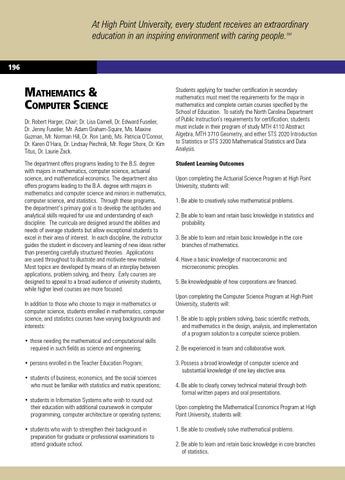At High Point University, every student receives an extraordinary education in an inspiring environment with caring people.SM 196
Mathematics & Computer Science Dr. Robert Harger, Chair; Dr. Lisa Carnell, Dr. Edward Fuselier, Dr. Jenny Fuselier, Mr. Adam Graham-Squire, Ms. Maxine Guzman, Mr. Norman Hill, Dr. Ron Lamb, Ms. Patricia O’Connor, Dr. Karen O’Hara, Dr. Lindsay Piechnik, Mr. Roger Shore, Dr. Kim Titus, Dr. Laurie Zack. The department offers programs leading to the B.S. degree with majors in mathematics, computer science, actuarial science, and mathematical economics. The department also offers programs leading to the B.A. degree with majors in mathematics and computer science and minors in mathematics, computer science, and statistics. Through these programs, the department’s primary goal is to develop the aptitudes and analytical skills required for use and understanding of each discipline. The curricula are designed around the abilities and needs of average students but allow exceptional students to excel in their area of interest. In each discipline, the instructor guides the student in discovery and learning of new ideas rather than presenting carefully structured theories. Applications are used throughout to illustrate and motivate new material. Most topics are developed by means of an interplay between applications, problem solving, and theory. Early courses are designed to appeal to a broad audience of university students, while higher level courses are more focused. In addition to those who choose to major in mathematics or computer science, students enrolled in mathematics, computer science, and statistics courses have varying backgrounds and interests: • those needing the mathematical and computational skills required in such fields as science and engineering; • persons enrolled in the Teacher Education Program; • students of business, economics, and the social sciences who must be familiar with statistics and matrix operations; • students in Information Systems who wish to round out their education with additional coursework in computer programming, computer architecture or operating systems; • students who wish to strengthen their background in preparation for graduate or professional examinations to attend graduate school.
Students applying for teacher certification in secondary mathematics must meet the requirements for the major in mathematics and complete certain courses specified by the School of Education. To satisfy the North Carolina Department of Public Instruction’s requirements for certification, students must include in their program of study MTH 4110 Abstract Algebra, MTH 3710 Geometry, and either STS 2020 Introduction to Statistics or STS 3200 Mathematical Statistics and Data Analysis. Student Learning Outcomes Upon completing the Actuarial Science Program at High Point University, students will: 1. Be able to creatively solve mathematical problems. 2. Be able to learn and retain basic knowledge in statistics and probability. 3. Be able to learn and retain basic knowledge in the core branches of mathematics. 4. Have a basic knowledge of macroeconomic and microeconomic principles. 5. Be knowledgeable of how corporations are financed. Upon completing the Computer Science Program at High Point University, students will: 1. Be able to apply problem solving, basic scientific methods, and mathematics in the design, analysis, and implementation of a program solution to a computer science problem. 2. Be experienced in team and collaborative work. 3. Possess a broad knowledge of computer science and substantial knowledge of one key elective area. 4. Be able to clearly convey technical material through both formal written papers and oral presentations. Upon completing the Mathematical Economics Program at High Point University, students will: 1. Be able to creatively solve mathematical problems. 2. Be able to learn and retain basic knowledge in core branches of statistics.
